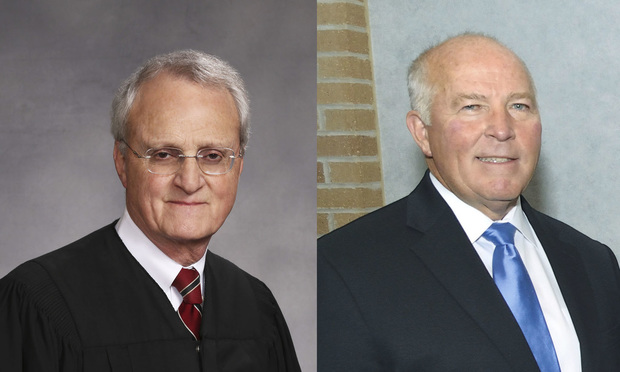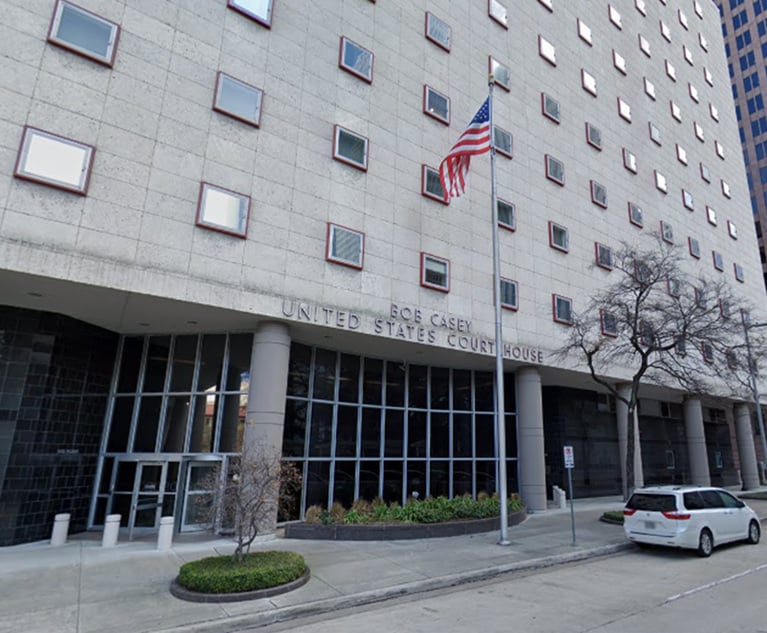Need a Judge Removed From a Case? 8 Tips—From Judges—on How To Do It
Texas Lawyer reached out to the judges who handle recusals and judicial disqualifications to gather their advice for attorneys who file these motions.
January 21, 2020 at 12:22 PM
5 minute read
 Judge David Peeples of San Antonio, left, and Ray Wheless, presiding judge of the First Administrative Judicial Region in Dallas, right.
Judge David Peeples of San Antonio, left, and Ray Wheless, presiding judge of the First Administrative Judicial Region in Dallas, right.
It's not enough for litigants to say they believe a judge is unfair.
Lawyers have to bring cold, hard proof if they have a shot at unseating the judge.
Many judges in Texas will voluntary step down from a case when there's good reasons. But what happens when the judge refuses to recuse?
When lawyers persist and file motions to recuse or disqualify that judge, these motions go before Texas' regional presiding judges, or visiting judges that they appoint. Statistics from the Texas Office of Court Administration show that only 6% of 370 motions were granted in fiscal year 2019, which ran Sept. 1, 2018 to Aug. 31, 2019.
Texas Lawyer reached out to the presiding judges who handle these motions to gather their advice for attorneys who seek to recuse or disqualify trial judges.
"In general, these are hard to have granted, but good lawyers who have valid reasons are successful," said Judge Ray Wheless, who presides over the First Administrative Judicial Region in Dallas.
See the stats:
Judges Don't Like Your Recusal Requests—And There's Data to Prove It
1. Forget feelings. Focus on admissible facts.
Wheless said that one of his pet peeves is when attorneys file motions that base arguments on general beliefs about a judge's bias or prejudice.
"They have to be based on the facts that would be admissible in evidence," he advised, noting that documents help the case immensely. "They need to allege just what the judge did or said that indicates to a reasonable person the judge is not fair."
2. Don't wait.
Wheless advised attorneys to file the motions right away when there are reasons, rather than waiting and filing later in a case.
"You have to file the motion to recuse as soon as you are aware the facts exist," Wheless said.
3. Don't follow the money.
Most recusal motions based on campaign contributions—for example, claiming opposing counsel donated money to judge—will also fail, unless it's a very high contribution, or there are other factors also present that bend towards the judge's recusal, said said Senior Judge David Peeples, who served 21 years as presiding judge of the Fourth Administrative Judicial Region in San Antonio.
"Relationships can be a reason," he said, noting that he recused from a divorce case involving friends and would likely step down from cases involving attorneys who sometimes go to lunch with him. However, in rural areas where a judge may know everyone in town, the judge may have to stay on cases even when he knows a lawyer involved, Peeples added.
4. 'Extraordinary' is key.
Peeples advised attorneys not to base a motion solely on a ruling with which they disagreed. There has to be some underlying reason, outside the case, or extraordinary judicial conduct in the case, he noted.
5. If it's public, capture it.
Wheless has seen motions succeed because a judge commented on a case on Facebook. If that happens, he told attorneys to attach a screenshot of the judge's post to their recusal motions.
"We've had some granted because of things that were said in the public arena," Wheless said. "Also, whenever external factors come to bear in the judge's decision, that's been a basis for the judge's recusal also."
6. Ask around.
Even with a chance of denial, lawyers file the motions because otherwise, they may face legal malpractice accusations from a client who argues that their attorney knew about grounds to recuse a judge, failed to do so, and it harmed the case, said Austin solo practitioner Lillian Hardwick.
Before pressing a motion to recuse, a lawyer should talk with one or two other lawyers, who aren't close to the case, to explain the situation with the judge in the case, and get their opinions on whether there is a real basis for recusal, Peeples said.
7. Present first-hand proof of fear.
The motions only succeed when there's a real concern—backed by evidence—that shows a reasonable person could conclude the judge couldn't be fair in the case, Peeples noted. The evidence can come in the form of documents, or testimony from a witness with first-hand knowledge of the issue.
8. Note comments from the bench.
Peeples has also granted motions because of statements judges made on the bench. In one such case, a judge—who thought an attorney had said something untrue in court—had said he could never again believe that lawyer.
"There was no question that the judge said it," Peeples said. "I thought it was enough to recuse that judge."
This content has been archived. It is available through our partners, LexisNexis® and Bloomberg Law.
To view this content, please continue to their sites.
Not a Lexis Subscriber?
Subscribe Now
Not a Bloomberg Law Subscriber?
Subscribe Now
NOT FOR REPRINT
© 2025 ALM Global, LLC, All Rights Reserved. Request academic re-use from www.copyright.com. All other uses, submit a request to [email protected]. For more information visit Asset & Logo Licensing.
You Might Like
View All
Conspiracy Suits Against Quinn Emanuel, Roc Nation Moved to Federal District Court

JCPenney Seeks Return of More Than $1.1M From Jackson Walker For Bankruptcy Work
3 minute read
Ex-Appellate Court Judges Launch Boutique Focused on Plaintiffs Appeals
2 minute read
O'Melveny, White & Case, Skadden Beef Up in Texas With Energy, Real Estate Lateral Partner Hires
5 minute readTrending Stories
- 1Uber Files RICO Suit Against Plaintiff-Side Firms Alleging Fraudulent Injury Claims
- 2The Law Firm Disrupted: Scrutinizing the Elephant More Than the Mouse
- 3Inherent Diminished Value Damages Unavailable to 3rd-Party Claimants, Court Says
- 4Pa. Defense Firm Sued by Client Over Ex-Eagles Player's $43.5M Med Mal Win
- 5Losses Mount at Morris Manning, but Departing Ex-Chair Stays Bullish About His Old Firm's Future
Who Got The Work
J. Brugh Lower of Gibbons has entered an appearance for industrial equipment supplier Devco Corporation in a pending trademark infringement lawsuit. The suit, accusing the defendant of selling knock-off Graco products, was filed Dec. 18 in New Jersey District Court by Rivkin Radler on behalf of Graco Inc. and Graco Minnesota. The case, assigned to U.S. District Judge Zahid N. Quraishi, is 3:24-cv-11294, Graco Inc. et al v. Devco Corporation.
Who Got The Work
Rebecca Maller-Stein and Kent A. Yalowitz of Arnold & Porter Kaye Scholer have entered their appearances for Hanaco Venture Capital and its executives, Lior Prosor and David Frankel, in a pending securities lawsuit. The action, filed on Dec. 24 in New York Southern District Court by Zell, Aron & Co. on behalf of Goldeneye Advisors, accuses the defendants of negligently and fraudulently managing the plaintiff's $1 million investment. The case, assigned to U.S. District Judge Vernon S. Broderick, is 1:24-cv-09918, Goldeneye Advisors, LLC v. Hanaco Venture Capital, Ltd. et al.
Who Got The Work
Attorneys from A&O Shearman has stepped in as defense counsel for Toronto-Dominion Bank and other defendants in a pending securities class action. The suit, filed Dec. 11 in New York Southern District Court by Bleichmar Fonti & Auld, accuses the defendants of concealing the bank's 'pervasive' deficiencies in regards to its compliance with the Bank Secrecy Act and the quality of its anti-money laundering controls. The case, assigned to U.S. District Judge Arun Subramanian, is 1:24-cv-09445, Gonzalez v. The Toronto-Dominion Bank et al.
Who Got The Work
Crown Castle International, a Pennsylvania company providing shared communications infrastructure, has turned to Luke D. Wolf of Gordon Rees Scully Mansukhani to fend off a pending breach-of-contract lawsuit. The court action, filed Nov. 25 in Michigan Eastern District Court by Hooper Hathaway PC on behalf of The Town Residences LLC, accuses Crown Castle of failing to transfer approximately $30,000 in utility payments from T-Mobile in breach of a roof-top lease and assignment agreement. The case, assigned to U.S. District Judge Susan K. Declercq, is 2:24-cv-13131, The Town Residences LLC v. T-Mobile US, Inc. et al.
Who Got The Work
Wilfred P. Coronato and Daniel M. Schwartz of McCarter & English have stepped in as defense counsel to Electrolux Home Products Inc. in a pending product liability lawsuit. The court action, filed Nov. 26 in New York Eastern District Court by Poulos Lopiccolo PC and Nagel Rice LLP on behalf of David Stern, alleges that the defendant's refrigerators’ drawers and shelving repeatedly break and fall apart within months after purchase. The case, assigned to U.S. District Judge Joan M. Azrack, is 2:24-cv-08204, Stern v. Electrolux Home Products, Inc.
Featured Firms
Law Offices of Gary Martin Hays & Associates, P.C.
(470) 294-1674
Law Offices of Mark E. Salomone
(857) 444-6468
Smith & Hassler
(713) 739-1250






